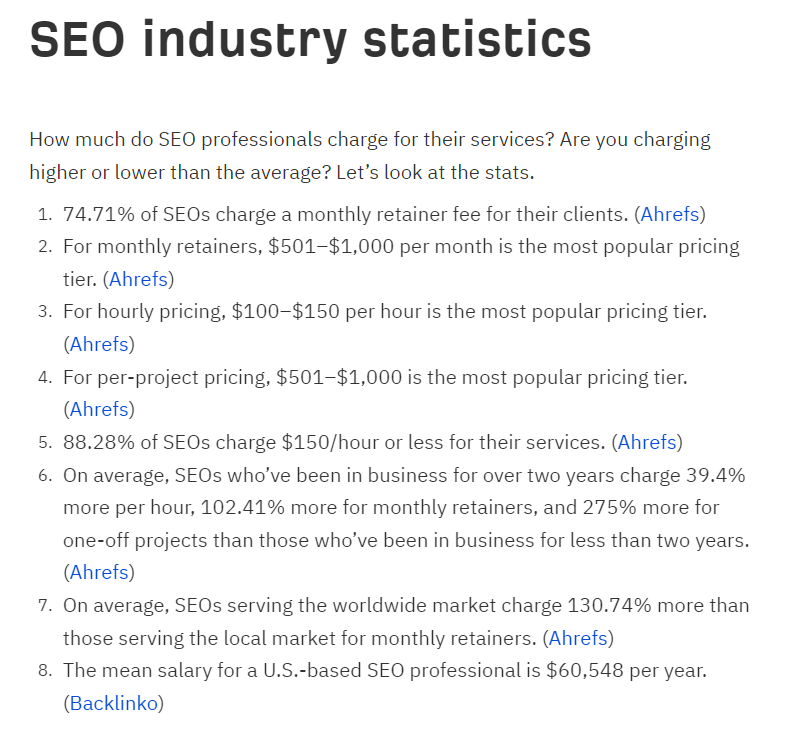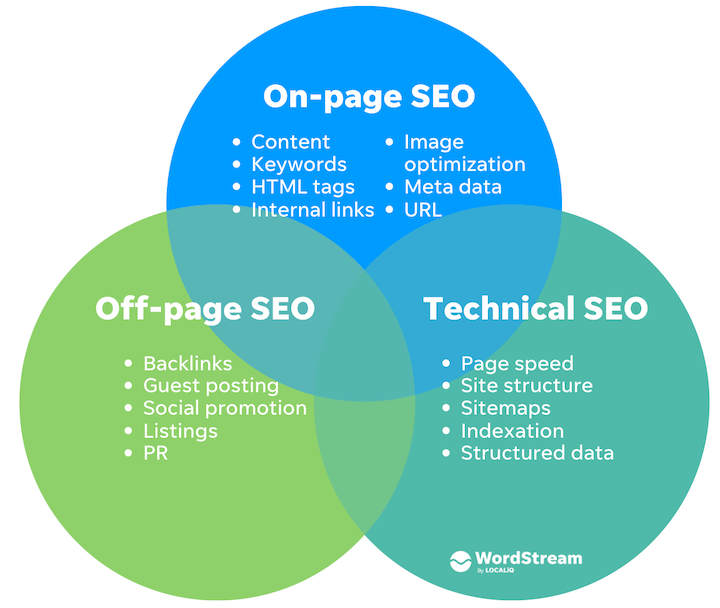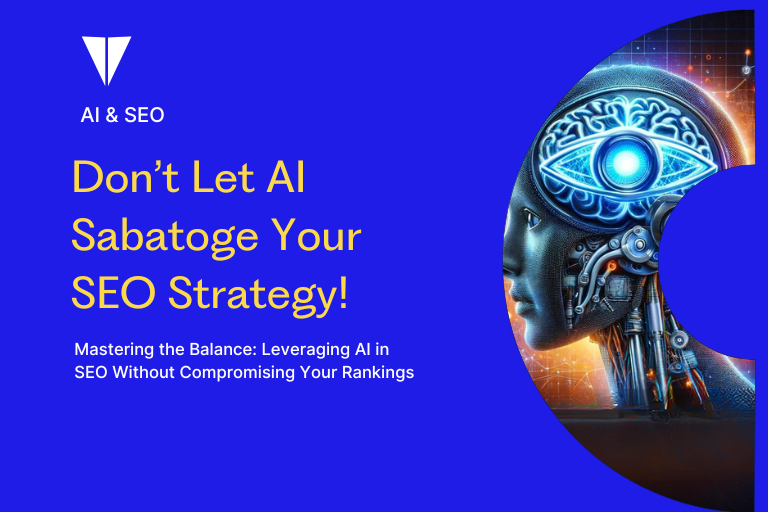How Much Does SEO Cost? Here’s What Decision-Makers Need to Know
Discover the true cost of SEO for your business. Learn how to navigate budgeting, pricing models, and other considerations to ensure success.

Here’s a loaded question if ever I’ve heard one: how much does SEO cost?
The real question however should be; how much does it cost to rank content for the search term, and target keywords that your target audience is searching for?
The benefits of SEO are well documented. Marketing stats for 2023 indicate that a search engine optimization (SEO) component to a overall digital marketing strategy is crucial for brand-building with a high return on investment.
That said, the value of SEO is relative to how your audience searches for products, your sales process, and the nature of your industry and competition.
I’ll provide a comprehensive overview to help you grasp the actual expenses associated with search engine optimization, and overall SEO cost.
Instead of simply outlining contractor rates, agency rate cards, and the pricing details of an SEO program, this article aims to offer digital marketing managers insights into making informed investment decisions in the current landscape of marketing for search engines.
Before delving into the details of seo cost, here’s a quick cheat sheet outlining industry “averages”.
While some brands may only require average investments, it’s crucial to recognize that this approach isn’t universally applicable and is highly context-dependent.
Anyone claiming that it costs $500/month to rank keywords on a site in the first position on the search engine results page (SERP) are most likely trying to sell you something.
When you come across claims in your busy timeline about ChatGPT being the future and replacing SEOs or a new tool automating SEO, keep in mind that the SEO strategists you’re competing with also have access to these tools. Cheap outsource work, SEO automation tools and AI for content are all just a means to an end.
Our goal is to determine the cost of executing an SEO campaign that enhances your existing brand awareness, generates leads and revenue, all while aligning with your project goals.
To comprehend this, we’ll first outline some key concepts and then assist you in creating a budget based on your specific needs.
These include:
- Defining your customer value
- The current state of SEO and what your investment involves
- Understanding your marketing team and capabilities
- The initial cost of an audit to assess the potential
- Key components of SEO
- Contractor vs. SEO Agency vs. In-House considerations
- SEO pricing rates
- Risk mitigation and maintaining market share
- Building your SEO budget
Defining Customer Value and Business Goals for SEO
I’ll touch on the value of SEO briefly here, as it is outlined in detail in another blog article “Understanding the True Value of SEO.” However, before delving into the topic of the cost of seo here, we need to understand value.
Important Note: Go through this exercise on value BEFORE you start your vendor search.
Consider the following questions: What is the value of a lead to your business? What’s your average basket size, repeat sales, and Customer Lifetime Value (CLV)?
A reliable SEO agency will collaborate with you to develop a plan that realistically guides you from your current position to your goals within a reasonable timeframe.
However, it’s essential to bring these key performance indicators (KPIs) to the forefront of your plan.When it comes to creating your budget, keep these factors in mind.
Amidst the multitude of companies selling various marketing services and prices, having a clear goal, such as generating a specific number of leads with a determined value to your brand, and a set budget for acquiring those leads, will be extremely beneficial.
If you lack concrete data, begin with assumptions and adjust as you progress.
Set incremental goals, consider where you want to be in a year, and envision your ambitious long-term objectives. Now, bring your XYZ metrics and brand goals along for the next step.
The State of SEO and What You’re Investing In
There is a reason many business owners say that Google (or Alphabet) has been printing money for the last 20 years.
They are the market leaders in search and put their users’s experience at the forefront of their business model and decisions.
The Search Engine Results Pages (SERPs) have been changing over the years with technological advancements, new products, and numerous algorithm updates, making today’s SERPs very different from a 2004 SERP.
Not to mention the upcoming changes with SGE and Bing leading the charge on innovating their search engines and results pages.
Now, there are knowledge graphs that bring in organized data directly into the SERPs, Google pulls in rich media like videos and images, that offer a multitude of ways for someone to search for a product.
Google offers different products for different types of searches, such as traditional search, local search, product search, image search, and YouTube for video search.
While the environment is complex, sticking to fundamental principles across your digital platforms can help you reach a larger audience than ever before. Some brands thrive by focusing on just one of these products, and not all of them are necessary for growth.
What’s important is that these are all new and exciting ways to increase your brand reach and turn views into purchases. It’s not as simple as just writing a blog and growing your brand anymore.
It’s more and more evident that SEO strategists are needed to guide program growth amongst marketers.
Understanding Your Marketing Team and Capabilities
Let’s talk about your internal experiences. I can’t stress enough how important internal experiences are to the type of vendor and the potential success of your campaign.
Have you or someone in your team managed an SEO campaign before? It’s valuable if you, a manager, or a stakeholder has firsthand experience in successfully growing a brand through SEO. This experience plays a significant role in how you establish a relationship with your vendors.
However, it’s important to note that while past experience matters, the SEO landscape has changed, and what worked before might not be as effective now. There might be areas for improvement or new insights that your previous project didn’t cover.
But it matters for building your team around you to execute your SEO campaign successfully!
Do you need a strategy built? Or perhaps you have a strategy but need quality assurance to ensure it stays on track? Maybe you’ve outlined your strategy and now need efficient execution. All these factors determine whether you need a contractor, SEO agency, or in-house staff to achieve your project goals.
Drawing from my 12+ years in the agency space, where I’ve managed a team or owned an agency for 10+ years, I can share that QA-ing SEO talent without a proven process is challenging! Understand your internal skills and experiences, and start from there. Then it’s a matter of building out from trust.
It’s incredibly expensive to make a mistake by choosing the wrong vendor. Not only do you risk the wasted time, let’s say at minimum three months, but potential damage to your brand.
Now, let’s talk about resources. You might have successfully scaled brands through profitable SEO campaigns in the past, but do you currently have the time and capabilities to execute the necessary tactics for success? Every industry is different, and having your agency guide your resourcing needs can be incredibly valuable.
Upfront Cost of an Audit to Understand Opportunity
When figuring out how much you should spend to achieve your project goals, I always suggest getting a report on organic search, including data on search volumes, competitiveness, and brand strategy.
I believe this investment is valuable because it helps determine what you stand to gain from investing in SEO. SEO isn’t a quick-win channel — it takes time and resources to succeed.
In my view, the most successful programs have buy-in from the entire organization. But if that’s not the case right away, don’t be discouraged; you can start building support gradually.
The cost of such a report can range from $1,000 to $10,000, depending on factors like company size, website, industry, and the specific requirements for the report.
As an illustration, we conduct SMB-style SWOT analyses for anywhere between $3,000 and $5,000, depending on project needs. For more extensive enterprise Audits/SWOTs with a detailed stakeholder decision-making report, the cost is $10,000.
If a client commits to a long-term partnership and signs up for our monthly management retainer, we include these reports in our foundational timeline. However, if a brand needs to demonstrate value upfront, especially when decision-makers need a clear path forward, this type of project is highly beneficial.
Key Budgeting Components of SEO
What goes into an SEO budget? Let’s look at the foundations of SEO.
- Website (Technical SEO)
- Content
- Authority (Brand/Content Trust)
You can see a breakout of these pillars in SEO speak here:
https://www.wordstream.com/blog/ws/2022/04/06/on-page-seo
To keep this article focused, we won’t delve into Local SEO (Google Business Profile) or break down E-commerce SEO specifics, even though Feed and product management are crucial and follow the same principles.
Now, let’s examine these three pillars and how to incorporate them into your budget.
Concerning your website, the Technical SEO costs are divided among your SEO vendor, development tools, and your development team, whether in-house or vendor-based.
In our budgeting recommendations for clients, we usually suggest setting aside a development budget for the “foundations” and audit implementation. The exact cost depends on the website and the development stack, but typically ranges from $1,500 to $5,000 for SMBs, especially if the site is built on WordPress.
If a complete rebuild or migration is necessary, these costs can increase, but let’s focus on audit implementation for now.
It’s also crucial to have ongoing maintenance and SEO development support. It’s highly advisable to allocate a monthly maintenance scope and include some buffer development hours to address new updates and optimizations suggested by the SEO team.
For an SMB WordPress site, this can start as low as $100 per month, but for more complex sites, it usually begins at $1,000 or more per month.
We personally love working with Bandicoot Marketing for our WordPress clients.
Next we need to ensure that the site has content to rank!
The approach here depends on your internal capabilities, the SEO audit findings, and the competitiveness and complexity of your industry. Here are some options to consider:
- Internal Resource – Billed at $25-$45/Hour
- Leverage AI and Content Editor – $0.02 – $0.05 per word + AI Editor time
- Manage group of writers – $0.07 – $0.15 per word + standard Editor time
- Content Marketplace – $0.10 – $0.25 per word
- Managed Content Writing Agency – $0.25 – $0.70 per word
- SME level content – $0.70+ per word
For brands aiming to scale, I typically recommend setting aside a budget of $5,000 – $10,000 for upfront core content writing. This ensures you have a budget for essential pages.
Next, plan your monthly content writing budgets based on your goals. For example, if you’re doing 4 posts per month at 1500 words each, using a content agency at $0.25 per word, you’ll want a monthly content creation budget starting at $1,500.
Depending on the brand and website size, and keyword goals, we usually execute between 8-12 monthly briefs. For some highly competitive keywords where enterprise content ranking needs around 2000+ words, the calculation might be 10 Content Requests x 2,000 words per article x 0.25/word = $5,000 per month content budget.
For brands aiming for competitive content and scalability, we typically recommend a managed content marketing agency, often working with Content Crowd.
Finally, the dreaded black box of costs, “Authority”. It’s certainly the trickiest part of any SEO budget to quantify, and has the widest spread of opinions on it’s value and necessity.
This article post isn’t aimed at those creating niche websites for personal gain, so we’ll skip discussions about (1) whether links are necessary for website ranking and (2) black hat tactics that can risk penalizing your website—though technically, any purchased links fall under the “black hat” category!
Building a budget for authority depends on your industry, competitors, and brand. While there are ways to secure low-cost web2 links and employ free tactics, these methods have limitations.
The main goals here are to:
- Foster more trust in your brand in Google’s eyes.
- Establish relevance and trust in specific content/pages.
There are various approaches to achieve this, such as buying links, hiring teams/vendors for outreach, creating linkable assets shared through social media and influencers, using digital PR, or sponsoring and partnering with brands. All of these strategies require some form of budget. While content and links might bring early gains, to truly stand out in a highly competitive keyword space and build a brand, some form of investment in authority building is necessary.
For most clients, an authority budget isn’t an immediate recommendation. However, when a comprehensive landscape assessment is needed, I would suggest considering a minimum link budget of $1,000 per month. Campaigns we’ve managed can range from $1,000 to $20,000 per month, and this isn’t just for big enterprise brands.
It’s crucial to view links as an annual budget, optimally utilized when link opportunities arise. Even if you allocate $2,500 per month, consider deploying it for a $5,000 sponsorship that brings significant value, rather than passing it up for two months of guest posts.
However, it’s important not to blindly purchase links without a strategy. They should always be managed through your SEO vendor to align with performance goals.
Now that we’ve covered the key pillars, let’s look at a simplified budget snapshot. While this overview simplifies the budget utilization, it still provides a good picture of the costs for deploying a scalable SEO solution for a brand looking for long-term growth.
Contractor vs SEO Agency vs In-House
You’ve figured out the value and established a budget, and now it’s time to discuss execution.
To assist decision-makers, let’s delve into some considerations for each type of execution.
When determining your SEO budget, a crucial decision is whether to engage a contractor, hire an SEO agency, or build an in-house team. Each choice has its advantages and drawbacks.
Contractor
Contractors can be a cost-effective option for specific projects or short-term needs. They bring expertise but may lack the full range of services an SEO agency provides. While you’ll have more direct control, it demands careful management. If you have trusted in-house SEO experts and know how to recruit and assess the quality of SEO specialists, choosing an SEO contractor could be a good fit. However, be mindful of capacity and workloads, as strong technical SEO skills don’t always equate to strong content marketing abilities. Reliability and meeting deadlines can be concerns with contractors.
Agency
SEO agencies boast diverse teams of specialists and abundant experience, handling comprehensive strategies and ongoing management. You gain reliability across a team and a brand backing its name and performance. However, agency services usually come at a premium cost, so thorough due diligence when choosing an agency is crucial.
In-House
Building an in-house SEO team provides full control and dedicated focus, ideal for long-term SEO efforts. Yet, it can be expensive due to salaries, benefits, and training. While some believe it saves money for growing businesses, I argue it’s often more expensive. This route becomes more sensible once your program matures.
Consider your organization’s goals, budget, and timeline when deciding the best option for your SEO needs. At NAV43, we’re open about advising you on the best path, so feel free to ask your agency. If you do your research and read this post, you’ll be well-equipped to pose your question effectively.
SEO Pricing Rates
SEO pricing can differ significantly based on factors such as project scope, industry competitiveness, and desired service quality. The key question is: how much should you allocate for SEO? Although there’s no one-size-fits-all answer, here’s a general guide:
Hourly Rates
Some SEO professionals charge by the hour, ranging from $75 to $300 or more. This model suits small projects or one-time audits. Contractors typically charge $75 – $125 per hour, general digital agencies without SEO specialization range from $125 – $175 per hour, and specialized SEO agencies can charge $200 – $300 per hour. Large AOR can go higher but these rates are project by project based SEO services.
Monthly Retainers
Most agencies offer monthly retainer packages, ranging from $1,000 – $5,000 for smaller businesses to $5,000 – $10,000 for scaling mid-market brands. These packages often include a set number of hours for various SEO activities. Enterprise SEO packages with extensive services can start at $10,000 or more.
- Small Businesses: Plan to allocate at least $1,000 to $2,500 per month for basic SEO services.
- Medium-Sized Businesses: Budgets for medium-sized businesses usually range from $2,000 to $5,000 per month for a more comprehensive strategy.
- Large Enterprises: Larger companies with extensive needs may spend $10,000 or more per month on SEO, depending on their scale.
Project-Based Pricing
For specific SEO projects like audits, content creation, or site migrations, seo costs can vary widely, ranging from $1,000 to several hundred thousand, depending on complexity. For sites with a million pages or requiring extensive content reviews or technical support, prices typically increase at a time and material rate.
Performance-Based
Some SEO agencies tie fees to performance outcomes, like increased rankings or traffic. However, this model can be riskier and may involve higher seo costs for both parties.
These figures are rough estimates and can vary based on industry, goals, and competition. Work closely with your chosen SEO provider to determine the right budget based on your needs. Always ask for a clear breakdown of included services and how success will be measured. Remember, the cheapest option isn’t always the best, especially for something as critical as SEO.
Risk Mitigation and Maintaining Market Share
Investing in SEO isn’t just about achieving rankings; it’s also about maintaining your market share and mitigating risks.
The digital landscape is constantly evolving, and search engines update their algorithms regularly.
Failing to adapt to these changes can lead to a sudden drop in organic traffic and revenue. This is where ongoing SEO efforts come into play.
Consistent SEO work is necessary to stay competitive, and the cost of maintaining your position is often less than the cost of reclaiming lost ground.
When budgeting for SEO, consider not just the upfront seo costs but also the ongoing monthly expenses required to keep your website optimized and competitive.
SEO Pricing Models
Where does the budget go? SEO agencies often offer different pricing models to cater to various business needs.
Local SEO
- If you’re a small business serving a specific geographic area, local SEO services are targeted at local keywords and centered around your Google Business Profile.
- This service pricing is typically the most affordable under $3,000 per month (Although it builds with more locations to optimize)
Ecommerce SEO
- E-commerce sites typically require more extensive optimization and product-feed work. You’ll need execution work focused at a product level on top of a content marketing budget.
Authority Building
- Links can be purchased as low as $100 or as high as $2,000 for one placement. The best authority building is link building alongside PR.
- You can execute a solid link building campaign for $2,500 – $5,000 but its definitely case by case!
Content Marketing
- This is all around the amount of content you’re need curated (briefed), written (word count), edited, optimized and published.
- Depending on the complexity of the topic and the need/availability of EEAT signals this can now also strongly vary.
Enterprise SEO
- Large companies with multiple websites or complex online presences may need customized enterprise-level SEO solutions.
- You’re often paying for time and materials and senior level resources alongside execution staff for these programs.
Expectations VS. Reality
It’s crucial to set realistic expectations for your SEO investment. SEO is a long-term strategy that takes time to deliver results.
It’s not a one-time expense but an ongoing commitment to improving your online visibility and authority.
I’ve actually created a piece on how to perceive the value of SEO – the 6 month shortcut vs the 18 month investment:
Be prepared for fluctuations in rankings and traffic, as these are common in the world of SEO.
What matters is the overall upward trajectory over time and that it’s driving a positive return on investment.
Additionally, while SEO can drive significant organic traffic, it’s not a guarantee of immediate sales.
Converting website visitors into customers depends on your website’s user experience, content quality, and the strength of your sales funnel. Don’t let the pursuit of scalability stop at traffic generation!
Conclusion: How Much Does SEO Cost Exactly?
In conclusion, the cost of SEO varies widely based on numerous factors, including your business size, industry, goals, and the scope of the project.
SEO is an investment in your online marketing presence and long-term success, and it’s essential to approach it strategically.
Consider the value of SEO in terms of lead generation, brand building, and revenue growth. Choose your SEO partner wisely, set realistic expectations, and be prepared to commit to ongoing efforts.
Think of your budgets being broken up into the following
- SEO Strategic Management
- Authority Budgets
- Content Budgets
- Internal Resource Costs
Ultimately, the answer to the question; how much does SEO cost, is a unique figure for each business, but when executed effectively, it can deliver a substantial return on investment and contribute significantly to your company’s growth and success in the digital landscape.
Morgan Leung
Wondering how much do Google Ads cost? Explore the essential cost considerations, optimization tips, and cost management strategies for your PPC campaign.
Morgan Leung
Wondering how much do Google Ads cost? Explore the essential cost considerations, optimization tips, and cost management strategies for your PPC campaign.
Peter Palarchio
Leverage AI in SEO without Compromising Your Rankings
Peter Palarchio
Leverage AI in SEO without Compromising Your Rankings
Theodore Park
hether you’re after sales, lead submissions, website engagement, product consideration, or others, there are tools and methods you can leverage to achieve your marketing goals!
Theodore Park
hether you’re after sales, lead submissions, website engagement, product consideration, or others, there are tools and methods you can leverage to achieve your marketing goals!













